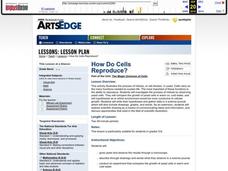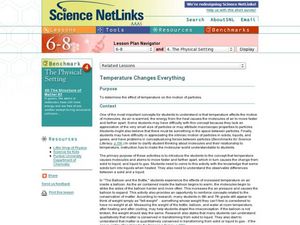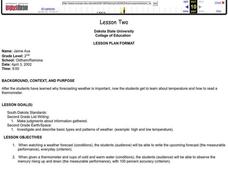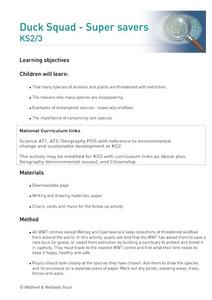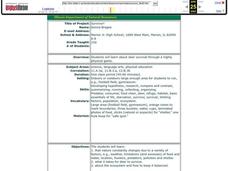Curated OER
Bioethics
Students are introduced to the issues surrounding bioethics and begin to discover how some of these values can influence decision making. The exciting part of this lesson is the constructivist method used to engage students of all...
Curated OER
Lunar Learning
Students learn about the phases of the moon. In this moon phases lesson, students learn about what causes the moon to look different to us everyday and how the Earth and Sun's position determine what phase the moon is in.
Curated OER
How Do Cells Reproduce?
Beginning biologists prepare a sugar solution for yeast cells to live in, and divide it into two different jars. Samples from each jar are viewed with a microscope, and then one jar is placed in a warm environment and the other a cold...
Curated OER
Temperature Changes Everything
Middle school chemists visit interactive websites in order to discover what happens to molecular motion when heat is added to matter. They conduct an experiment that demonstrates the expansion of matter with the addition of heat. A lab...
Curated OER
Introducing Recycling
Students study environmental issues of excess garbage and learn about recycling. For this recycling lesson, students discuss recycling and read a story about too much garbage. Students write a persuasive essay about the importance of...
Curated OER
Investigating the Response of Worms to Soil Improvers
The worms crawl in, the worms crawl out, but do they care what soil is all about? Find out in an easy and fun controlled experiment. Have your young biologists hypothesize, test, and draw conclusions about which type of soil worms...
Curated OER
Micro-Climate
Atmosphere aces investigate the microclimates that exist within a larger area. They use a thermometer to record the varying temperatures and identify the microclimates on a map that they have drawn. This exercise helps them to understand...
Curated OER
Beef and Beef By-Products
Learners examine the various types of beef and the many uses of its by-products. They increase their knowledge by playing a game of "beef bingo."They discuss what parts of beef animals are their by-products.
Curated OER
Earthquake Plan
Young scholars discuss what to do in the event of an earthquake. They develop an earthquake plan and practice it. They also discuss their fears about earthquakes.
Curated OER
Gallery Walk Questions on Earth's Radiation Balance
Questions that can be used in a lesson on Earth's radiation balance are suggested in this resource. It is not a lesson plan, per se, but it is a list of questions for stations within a "Gallery Walk" lesson. The link to how Gallery Walks...
Curated OER
Lesson Two
Second graders, after assessing why forecasting weather is important, study about temperature and how to read a thermometer. They experiment being able to observe the mercury rising up and down when given a thermometer and cups of cold...
Curated OER
Animals Around the World
Students study different kinds of animals and what group they belong to. In this animal classification lesson students view different animals and sort them by what group they belong to, for example a snake is in the reptile...
Curated OER
Urban Ecosystems 4: Metabolism of Urban Ecosystems
Cities are compared to living, breathing, metabolizing organisms. Fourth in a five-part series of lessons, this one focuses on the flow of materials through a city. Links to interesting websites and images make your delivery of...
Curated OER
Strawberry Smoothies
Biologists extract the DNA from a strawberry. After completing the procedure, learners write answers to a few questions on the lab sheet provided. This is ideal lab practice during a DNA unit in your general biology course.
National Center for Case Study Teaching in Science
A Healthy Retirement?
Do men and women experience heart disease the same way? High school and college-level biologists examine a case study about a woman, Nancy, who is experiencing intermittent health issues; looking at her diet, exercise, and lifestyle...
Teach Engineering
Biological Processes: Putting Microbes to Work
Is there such a thing as useful microbes? Get ready to perform experiments on applying microbes for wastewater treatment. The first installment of the three-part unit provides background information to prepare young engineers for two...
Curated OER
Design a Reef!
Here is an ambitious, but highly valuable undertaking: set up a miniature coral reef in your classroom. Young marine scientists research coral reef ecosystems and ensure all vital factors are included in their functioning model. The...
Curated OER
Duck Squad-Super Savers
Students "save" a rare duck (or goose, or swan) from extinction by "building" a sanctuary to protect and breed it in captivity. They research what the bird needs and draw the species and its enclosure.
Curated OER
Farm Animals
Why are farm animals important to the community? Expand young farmers' knowledge of furry and feathered friends through stories and a video. There are several books recommended; however, you could use any book about farm animals. A video...
Curated OER
Radiation Budget Lesson: Exploring Albedo
Young scholars experiment with sunlight and temperature. They study the definition of albedo, or the percentage of incoming sunlight that is reflected, rather than absorbed.
Curated OER
The Sweet Connection
Students use maps to find what crops are dominant in areas where honey bees are raised and discuss possible correlations. They mark the top ten honey- producing states on a US map.
Curated OER
Get the Drift?
The anticipatory set is clever: give groups five minutes to work on the puzzle and then discuss what strategies they used to match the few that connected. This introduces middle schoolers to the concept of continental drift. A portion of...
Curated OER
Problem Solving in Genetic Disorders
A class of older and academically mature students are divided into pairs, usually one male and one female and are told that they are expecting a child. Unfortunately, their child may or may not have inherited some form of genetic...
Curated OER
Survivor!
Students play a game in physical education class to examine how a deer survives. Using nature as a guide, they discover how it is constantly changing due to weather, food, water, pollution and predators. They discuss the characteristics...


